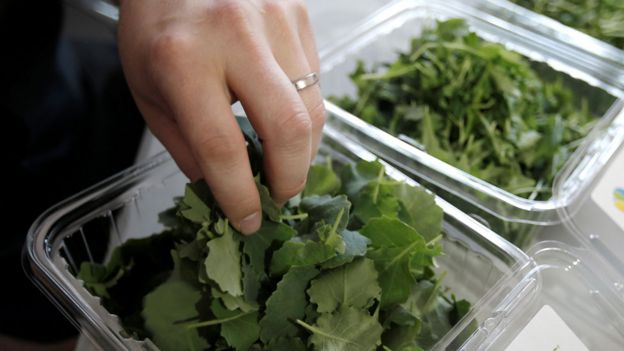Twelve weeks later, I returned to City University to see whether my daily pill-popping had made any difference to my eyesight. The results surprised even Prof Barbur. There were significant improvements in several different aspects - my blue and yellow colour perception was back to normal and my night vision was much better. The levels of my protective macular pigments were also boosted.
The results were less of a surprise to Prof John Nolan, who I went to meet in Waterford, in south-east Ireland. His team has been studying macular pigments for many years, and recently completed a year-long trial with over 100 participants in which they had seen similar results to mine.
They found that boosting the diet with the three macular pigments - lutein, zeaxanthin and meso-zeaxanthin - led to significant improvements in the protection of the delicate macula, as well as improved eyesight.
There is also some evidence that such supplementation may help slow or possibly even prevent, age-related macular degeneration (AMD) - the leading cause of vision loss in the UK. However, this is still controversial.
Should we all, then, be taking supplements to protect and even improve our eyesight?
 REUTERS
REUTERSWell, the research certainly shows that supplements work. Even for someone like me, who has a relatively healthy diet with plenty of fruit and vegetables, and whose blood levels of the compounds that weren't particularly low, the supplements helped. However, some researchers believe that diet can simply be enough, if we eat the right things.
More research needs to be done on the best dietary sources for each of the three macular pigments.
Lutein is a yellow compound made only by plants. They make it in order to absorb blue light, as part of their mechanism to capture energy from sunlight through photosynthesis. Animals then get it from eating plants - good sources are green kale and spinach, or the yellow yolks of eggs.
It is used as a supplement to feed industrially-reared chickens to make their yolks a more attractive yellow (and, being fat-soluble, ends up turning their skin and fat yellow too).
Zeaxanthin is another yellow compound, almost identical to lutein, made by plants to absorb light. It is the chemical that gives corn, bell peppers and saffron their yellow colour.
Meso-zeaxanthin is a form of zeaxanthin not generally found in plants, but it is made in the body from lutein. More research needs to be done on how efficient this process is. It is found in some fish (particularly in the skins), but in supplements containing marigold extract, it appears that the industrial processing that the marigolds undergo can create meso-zeaxanthin (and it has been found to be in some marigold-extract supplements, even when not listed on the label).
Our volunteers taking the smoothie containing amounts of plant sources calculated to give them a boost of lutein and zeaxanthin did indeed boost their lutein levels, but not their zeaxanthin. Clearly more work needs to be done to refine the recipe. So, this might be a rare occasion where, given the current state of research, I might end up on the side of supplements - especially for those who don't eat as many leafy greens as they should, and for older people (who absorb nutrients less efficiently).
However, for all of those whose mothers and grandmothers told them that carrots would improve their vision the message is this - although lutein, zeaxanthin and meso-zeaxanthin are all chemicals known as "carotenoids", and carrots do owe the yellow portion of their colour to them, these particular key compounds are found mainly in the green parts of plants above ground.
So, if you want to improve your eyesight, I'm afraid it's munching on leafy greens (taken with some fats to help absorb these fat-soluble chemicals) that will do the best job.
Michael Mosley presents Trust Me, I'm A Doctor which is on Thursday 8 September on BBC Two at 20:00 BST
'via Blog this'
No comments:
Post a Comment